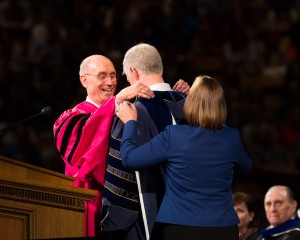
President Kevin J Worthen described the spiritual symbolism of mountains to students, Church leaders and alumni at his BYU inaugural address on Sept. 9.
Henry B. Eyring installed President Worthen as BYU’s 13th president. He highlighted the new president’s leadership experience and ability to accomplish BYU’s mission statement, “Enter to learn, go forth to serve.”
President Eyring emphasized that students should begin to serve now, throughout their education at BYU, teaching and participating in studies with each other. “All can share in the faith that with God’s help they can learn, and then they can help others learn, grow and change for the better,” he said.
President Eyring said although President Worthen will be busy with administrative tasks, he is confident of his commitment to the BYU core values of learning, teaching and serving.
He bore witness that he has seen the hand of the Lord in guiding and prospering BYU. He continued to testify of God the Father and of Jesus Christ, who are attentive to personal needs as students study and serve others.
After President Eyring’s remarks and warm welcome, President Worthen gave his first address as the president of BYU.
He reiterated BYU’s mission statement, reading, “We are to ‘assist individuals in their quest for perfection and eternal life’ by providing ‘a period of intensive learning’ that includes not just the ‘arts, letters and sciences’ but also the ‘truths of the gospel of Jesus Christ.'”
To explain how students can move this work forward, President Worthen confidently said, “By going to the mountains.”
President Worthen announced that the mountains will be a personal symbol to him during his time as president. Specifically, Y Mountain represents to him the unique spectrum of educational experiences students and faculty can participate in.
“The block Y can remind us of the unique education that we are to provide our students — one that is broad, deep, spiritual and character building,” President Worthen said.
He expanded the symbolism of mountains in three unique ways, describing his hope for an educational process that motivates students to be “enlightened, uplifted and changed.”
1. Mountains as a place of instruction
He said mountains are places of instruction and new understanding. Students can have “mountain” experiences inside classrooms, labs and offices. “Students and faculty alike should ascend high enough in their disciplines to think new thoughts, to find new ways to make things better,” he said.
2. Mountains as a place of spiritual communication
Receiving revelation requires students and faculty to live in a way that allows God to guide and direct personal pathways, including adherence to the Honor Code.
3. Mountains as a place of transfiguration
President Worthen stressed that mountains are places of transfiguration, “where individuals are transformed and changed in significant ways.” He said mountains provide a place to receive increased light.
BYU is similarly a place where students can receive increased light, providing significant growth and change. “We need to provide an education that allows our students not just to learn new things and to experience spiritual insights, but to become different, better people,” President Worthen said.
He completed his message by illustrating a larger picture, beyond students’ time at BYU. “As imposing as Y Mountain may seem from its base, it is not the tallest mountain to the east of campus. As you reach the summit of that mountain, you realize there are higher mountains behind it.”
President Worthen encouraged students and faculty to strive to be elevated intellectually, spiritually and in character-building ways to rise above challenges and opportunities they have never faced before. President Worthen and President Eyring motivated students and faculty to elevate themselves and others by striving to achieve BYU’s mission statement.




